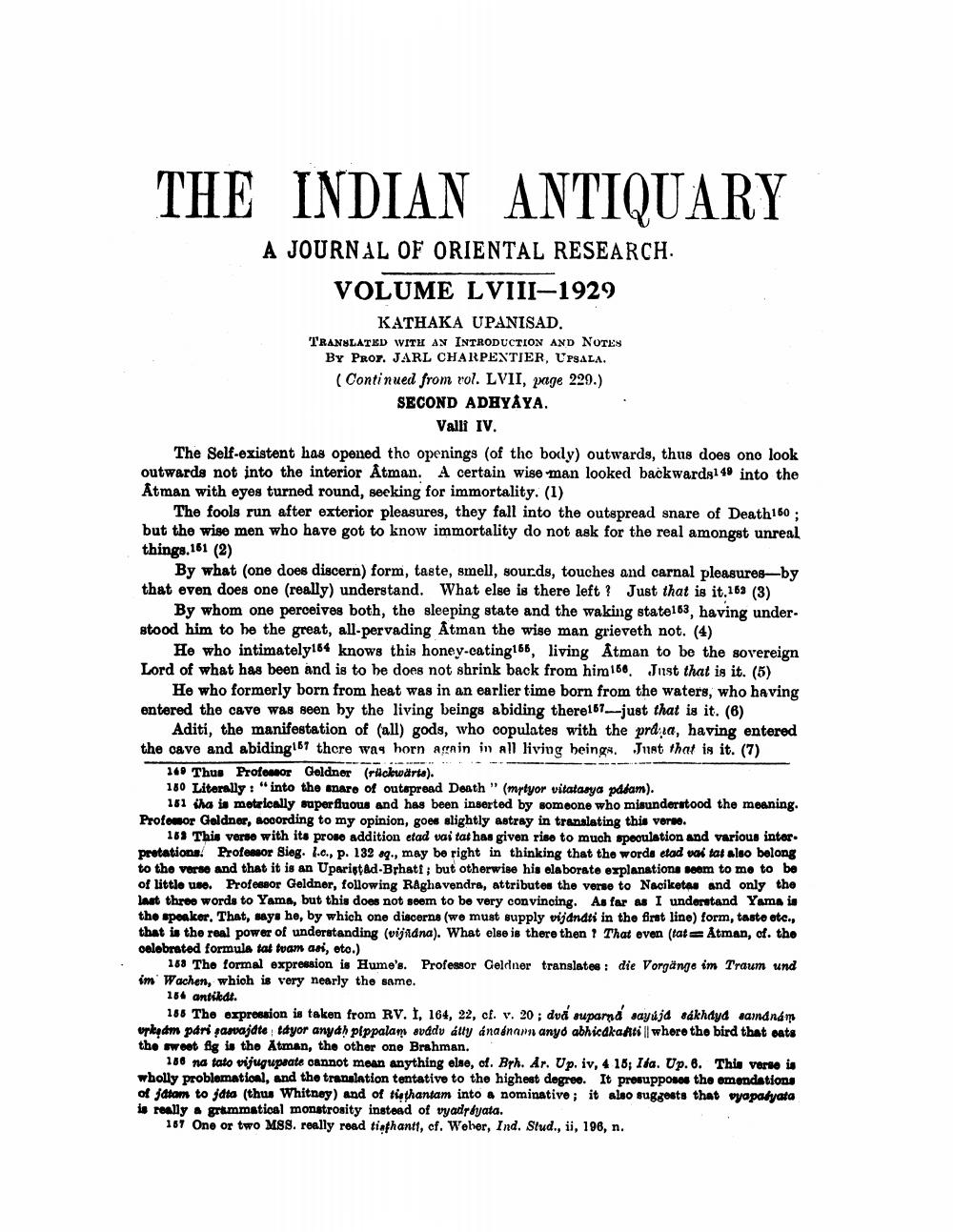Book Title: Indian Antiquary Vol 58 Author(s): Richard Carnac Temple, Charles E A W Oldham, S Krishnaswami Aiyangar, Devadatta Ramkrishna Bhandarka Publisher: Swati Publications View full book textPage 7
________________ THE INDIAN ANTIQUARY A JOURNAL OF ORIENTAL RESEARCH VOLUME LVIII–1929 KATHAKA UPANISAD. TRANSLATED WITH AN INTRODUCTION AND NOTES BY PROF. JARL CHARPENTIER, UPSALA. (Continued from rol. LVII, page 229.) SECOND ADHYAYA. Valli iv. The Self-existent has opened tho openings (of the body) outwards, thus does ono look outwards not into the interior Åtman. A certain wise man looked backwards1 49 into the Atman with eyes turned round, seeking for immortality. (1) The fools run after exterior pleasures, they fall into the outspread snare of Death 160 ; but the wise men who have got to know immortality do not ask for the real amongst unreal things.161 (2) By what (one does discern) form, taste, smell, sourds, touches and carnal pleasures-by that even does one (really) understand. What else is there left ? Just that is it.163 (3) By whom one perceives both, the sleeping state and the waking state163, having under. stood him to be the great, all-pervading Atman the wise man grieveth not. (4) He who intimately164 knows this honey-cating166, living Atman to be the sovereign Lord of what has been and is to be does not shrink back from him 166. Just that is it. (5) He who formerly born from heat was in an earlier time born from the waters, who having entered the cave was seen by the living beings abiding there167-just that is it. (6) Aditi, the manifestation of (all) gods, who copulates with the prda, having entered the cave and abiding 67 there wag horn again in all living being. Just that is it. (7) 149 Thus Professor Geldner (rückwärte). 180 Literally " into the maro of outspread Death" (motyor vitatasya pddam). 161 iha is metrically superfluous and has been inserted by someone who misunderstood the meaning. Profonor Goldner, according to my opinion, goes slightly astray in translating this verso 169 This verso with its prose addition etad vai tat has given rise to much speoulation and various intor. pretations. Professor Sieg. I.o., p. 132 sq., may be right in thinking that the words etad var tat also belong to the verse and that it is an Uparistad-Brhatf; but otherwise his olaborate explanations seem to me to be of little use. Professor Geldner, following Raghavendra, attributes the verse to Naciketes and only the last three words to Yama, but this does not seem to be very convincing. As far as I understand Yama is the speaker, That, says he, by which one discerns (we must supply vijanati in the first line) form, taste etc., that is the real power of understanding (vijnana). What else is there then that oven (tat=Atman, of the celebrated formula tat tuam asi, eto.) 168 The formal expression is Hume's. Professor Geldner translates: die Vorgänge im Traum und im Wachen, which is very nearly the same. 164 antikdt. 188 The expression is taken from RV. I, 164, 22, cf. v. 20; dva suparna sayújd sákhdyd sandnám orkedm pari samvajate Layor anya) pippalam avádv átty ánaánann anyo abhicakaat || where the bird that oats the sweet flg is the Atman, the other one Brahman. " 186 na tato vijugupeate cannot mean anything else, of. Brh. Ar. Up. iv, 4 18: Ida. Up. 6. This verse is wholly problematioul, and the translation tentative to the highest degree. It presupposes the emendations of jatam to jata (thus Whitney) and of tiethantam into a nominative; it also suggests that oyapatyata is really a grammatical monstrosity instead of vyadt hjata. 167 One or two MSS. really read tiafhanti, cf. Weher, Ind. Stud., ii, 196, n.Page Navigation
1 ... 5 6 7 8 9 10 11 12 13 14 15 16 17 18 19 20 21 22 23 24 25 26 27 28 29 30 31 32 33 34 35 36 37 38 39 40 41 42 43 44 45 46 47 48 49 50 51 52 53 54 55 56 57 58 59 60 61 62 63 64 65 66 67 68 69 70 71 72 ... 408
